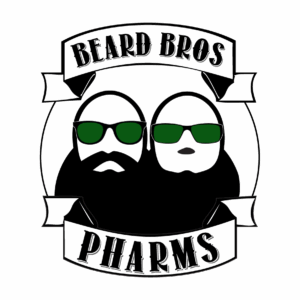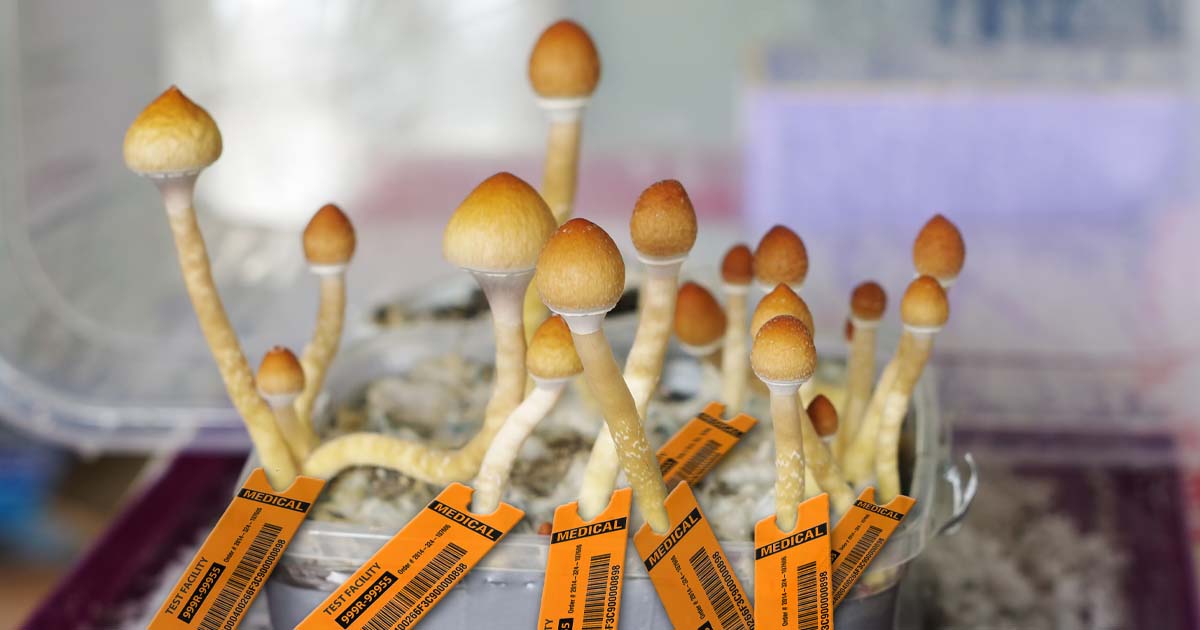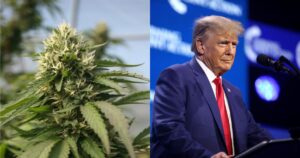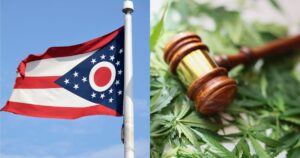Last month, voters in Oregon passed Measure 109 which will establish the nation’s first legal adult-use market for psilocybin mushrooms. The language of the measure that was voted on lays out a rough guideline of what such a market will look like, with access to the psychedelic fungi only being available at state-sanctioned therapy centers, to be consumed only onsite in the presence of a trained professional.
There are a lot of layers there, but this is certainly a pioneering effort now underway in Oregon where the state’s head regulatory body, the OLCC (Oregon Liquor Control Commission), in conjunction with the Oregon Health Authority, now has two years to finalize the framework under which this new market must operate.
Two weeks ago, the OLCC put out an otherwise mundane press release recapping their monthly meeting from the previous day, mostly covering updates about the state’s cannabis markets which the commission also oversees. Also in the release, however, was an update on how the commission, along with the Oregon Health Authority (OHA) plans to regulate the new therapeutic psilocybin market to come.
Measure 109 specifically instructs the OLCC to partner up with OHA so that the latter can use the state’s digital seed-to-sale cannabis tracking system – nefariously known as METRC – as a means to track and trace the psychedelic mushrooms that will be grown for the new therapeutic marketplace.
As with legal cannabis, we’re told that this is done to deter what is known by regulators as “diversion” and is known on the streets as trapping. So, in their first public-facing statements on the passage of Measure 109, the OLCC prioritized battling diversion above all else by promising to use software versus nature.
With weed, each plant is given a METRC tag as soon as it is cloned or sprouted, allowing it to be tracked by regulators from seed to sale and at every stop on the supply chain along the way. The idea is that if they know what you started with, they feel they have a pretty good idea that they know what you’ll end up with.
This serves a dual purpose for the suits as it ensures that they get their cut, and they can then say that they’ve done their part to keep the plant off the streets.
Staying compliant under METRC is, by almost all accounts, a major headache for cannabis operators who already have so much blood in the game most wouldn’t dare risk it all just to push a few packs out the back door.
 Tracking such a diverse plant in a completely new marketplace from seed to sale has proven to be a challenge. So, what about spore to sale?
Tracking such a diverse plant in a completely new marketplace from seed to sale has proven to be a challenge. So, what about spore to sale?
You can take an awful lot of cuts off of a room full of mother cannabis plants but just one mushroom cap can contain (and release) hundreds of thousands of spores, each with the potential to spawn hundreds of thousands more.
Colin Wells from Veterans Walk & Talk likened it to trying to track cannabis from pollen to sale, rather than from “seed to sale”.
So the two of us dove a bit deeper into the subject to see if governments might be able to track and trace psilocybin in emerging markets, how they might try to do so, and if they even need to.
MUSHROOMS LEGAL? F-YOU, PAY ME
Perhaps the biggest barrier to the legalization of both cannabis and of psilocybin-rich mushrooms is not public safety, it is the fact that pretty much anyone can grow their own at home.
It’s awfully hard for local, state, and federal governments to get their piece of that action. Compare that to Big Pharma which is literally wining and dining these assholes.
The answer to “diversion” is the same with both cannabis and psychedelics – make it more affordable and more convenient than the streets. Period. We don’t have to criminalize plants or fungi. We don’t have to put people behind bars for them anymore. We certainly don’t need to spend millions of dollars trying to track the course of every mushroom that comes to fruition.
If you have ever seen a tub of cultivated psilocybin fruiting, you know that physically placing some sort of METRC tag on each shroom is laughably not an option.
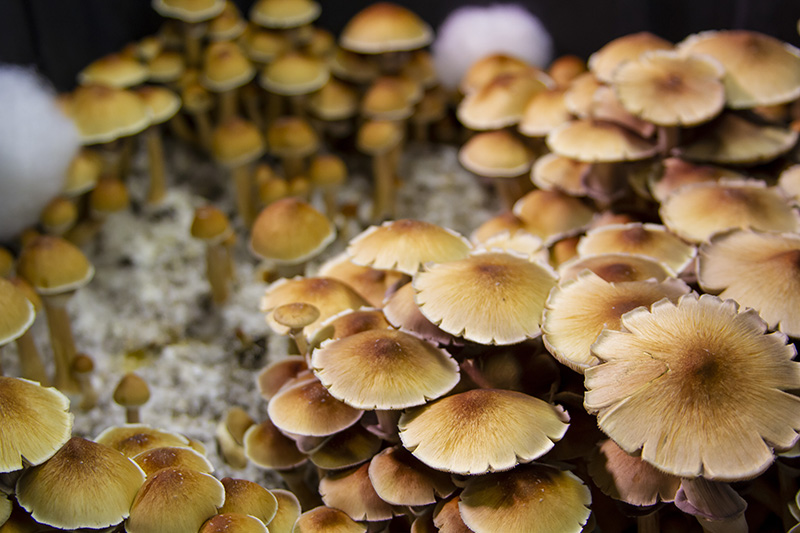
So, you could tag each tub but how could any regulator ever determine what that tub actually yielded under that tag? It varies every “harvest” and the growing substrate in each tub can fruit multiple times – sometimes increasing in yield each time, sometimes decreasing.
At the end of the day, the amount of tax revenue back to the state from this program will depend on how effectively they can assess and collect that 15% tax they promise to impose. That is why they track and trace cannabis and that’s why they want to track and trace mushrooms.
MESSIN’ WITH GENETICS
As we have already mentioned, the way that mushrooms propagate and the way that cannabis propagates are two very different processes, and with each shroom cap potentially carrying hundreds of thousands of spores, it seems obvious that trying to track each and every one of them would be a fool’s errand.
What we are already seeing happen in commercial agriculture goes way beyond physically tagging plants to track them, but genetically tagging things like mushrooms to make them express desired traits (larger yields, more insect resistance, or in the case of culinary mushrooms, to keep them fresher longer post-harvest).
This tech is carrying over to psilocybin mycology with some cultivators genetically modifying the DNA structure of a certain strain of mushroom in a way that would allow them to identify that marker forever if those genetics were being used without permission.
If that sounds like the way that Monsanto rules mom and pop farms with an iron fist that’s because it’s an almost identical model and mindset.
Is this the endgame for psilocybin? Or for cannabis for that matter?
Those in favor of such technology implore the rest of us to focus on the end product, not the “procedure” to get there. That “procedure” is our culture, though, and our culture is not as fringe as it used to be.
In addition to Measure 109 in Oregon, voters there also passed Measure 110 last month, effectively decriminalizing ALL controlled substances. While this has led to a flood of coke and meth memes, it is important to remember that psilocybin still sits on Schedule I of the Controlled Substances Act.
Measure 110 will not “legalize” psilocybin mushrooms in Oregon but having a bag of them on you will no longer result in criminal charges. People can grow them themselves in a shoebox-sized tub in a closet and produce way, way more than they ever plan to ingest, so, tell us again what track and trace is really all about.
Clearly, the Oregon Health Authority has its work cut out for it in trying to implement a janky cannabis tracking system in order to oversee an entirely different product and supply chain.
Curiously, the OLCC seems to acknowledge the limitations of the METRC program in the state’s regulated cannabis markets as the most common infractions are treated more like a “fix-it” ticket than a misdemeanor, usually allowing the uncompliant operator to make the correction before fines or punitive actions are assessed.
Even with psilocybin, it seems that they announced the integration with METRC first just to get it out of the way. Later in the November 20 press release, the OLCC says that it has reached out to METRC on behalf of OHA, but that neither agency will take further action on it during the pandemic as their resources and priorities are occupied.
To us, it looks like one of two things:
- They have to say something and/or pretend to do something about the potential for “diversion” since that is every prohibitionist’s buzzword
- They are setting the table for genetic tagging which could eventually not only track and trace psilocybin for compliance purposes, but for patent protection purposes as well
Colin summed it up best when we arrived at this bottom line, saying, “What happened with cannabis cannot happen with mushrooms. There is no monetary value for healing – it’s a right.”
Oregon now has two years to figure it out or arrive at the same conclusion that we did: You cannot track psilocybin from spore to sale, and you don’t need to.
- Maryland Leads the Way in Cannabis Pardons, Setting an Example for Much-Needed Cannabis Reform
- Military Construction and Veterans Affairs Bill Amendments Could Change Medical Marijuana and MDMA-Assisted Therapy Options for Veterans
- Thailand’s U-Turn on Recreational Cannabis Use
- Chicago Police Department Revises Policy on Searches Based Solely on Marijuana Odor
- Ohio’s Senate Bill 56 Postponed, Leaving Details of Issue 2 Still Unresolved
- Sports Stars and Well Known Entertainers Join Forces Calling on Trump for Cannabis Reform

